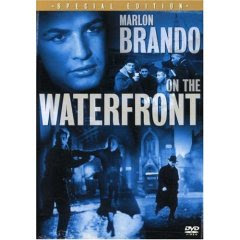On the Waterfront is a movie that is more than 50 years old now, but it can still make an impact. The movie was an incredible career booster for Marlon Brando, giving him a massive reputation in the Oscar-winning role of a man who was just passing through life as a 'bum', being the lackey of a mob boss in the union, until a couple of deaths and the inspiring words of a priest and the sister of one of the ones killed caused his conscience to slowly come back to life and get him to do the right thing. The movie portrays an end full of optimism, with the breaking of the control of the mob boss who controlled the union of longshoremen. The whole situation was that of exploitation of the dock workers, and corruption and use of force in order to retain the control of the boss.
This movie had a certain amount of history in terms of reasons for it being made. The movie was directed by Elia Kazan; he was controversial because he had reported names of possible communists in the American film industry in 1952 (2 years before the making of this movie) to the House Un-American Activities Commission, and he had been criticized for this action. The release of a movie in which the hero breaks the might of a mighty corrupt and evil authority by 'squealing' / 'telling the truth' before a Government commission investigating the waterfront was seen as an answer to the claims made earlier against Kazan that he was a squealer.
Around the period in which the movie was made, the scene of the waterfront was indeed a place of oppression in which ordinary workers had no dignity, only those got jobs whom the boss of the union decided or were in his favor, and there was a systematic exploitation of these workers. The movie was actually based on a Pulitzer Prize winning series of 24 articles in 1949 in the New York Sun by reporter Malcolm Johnson called 'Crime on the Waterfront'. The article was a harsh expose on the scene on the waterfront, detailing bribery, corruption, payoffs, kickbacks to union officials, theft, murder and a generally oppressive culture.
The movie was seen as such a striking movie with its portrayal of the activities on the waterfront, a great melodrama, and an incredible performance by Marlon Brando that it was nominated for a total of 12 nominations and won 8 nominations, putting it at a very pedestral in terms of awards won:
* Best Actor - Marlon Brando
* Best Picture - Sam Spiegel, producer
* Best Supporting Actress - Eva Marie Saint
* Best Art Direction - Set Decoration, Black-and-White - Richard Day
* Best Cinematography, Black-and-White - Boris Kaufman
* Directing - Elia Kazan
* Film Editing - Gene Milford
* Writing, Story and Screenplay - Budd Schulberg
Nominations that did not win
* Best Supporting Actor - Lee J. Cobb
* Best Supporting Actor - Karl Malden
* Best Supporting Actor - Rod Steiger
* Music Score of a Dramatic or Comedy Picture - Leonard Bernstein
The movie is about a former boxer Terry Malloy who is somewhat slow-witted. He manages to survive by being the odd job man for the union boss Johnny Friendly. His brother Charles Malloy, is the lawyer for Johnny Friendly. He is just content doing jobs given to him by the union boss and for his pleasure, rears pigeons. The chief property of the union is that no information is to be given to outsiders about anything, a policy of D n D (Deaf and Dumb) - similar to the mafia code of omerta. But, another young dock worker is about to report whatever he knows to an investigating committee, and this trouble-maker needs to be eliminated. Terry is used to call him, and then this young worker Joey is then thrown off a roof by 2 of the boss's henchmen. This horrified Terry, since he is the conduit through which Joey was called to his death.
Slowly things start changing due to the impact of a local priest who is trying to rouse the workers from their lethargy; and more so due to a slowly forming attraction between Terry and Edie (sister of the dead Joey). Both Friendly and Charles see this change starting to happen in Terry, but are unable to stop him. Over a period of time, Terry starts to feel his conscience starts to awaken and he starts to shrug off his sluggish nature. He in fact almost breaks with his brother by blaming him for the way his life had turned out (his brother had asked him to throw a match against another boxer and his life had taken a turn for the worse after that).
Towards the end, his brother is killed by Friendly because of being unable to prevent Terry from giving tetimony, and Terry goes ahead and implicated Friendly in the death of Joey. In a bruising scene after that on the waterfront, Terry fights Friendly and then his henchmen, and gets badly beaten up. However, he has the ultimate triumph when the other workers all line up behind him and throw off the fear of the union boss.
Saturday, February 2, 2008
On the Waterfront (1954)
Posted by
Ashish Agarwal
at
2/02/2008 06:44:00 PM
![]()
Labels: Action, Classic, Corruption, English, Mafia, Movie, Oscar, Ruthless
Subscribe to:
Post Comments (Atom)
No comments:
Post a Comment